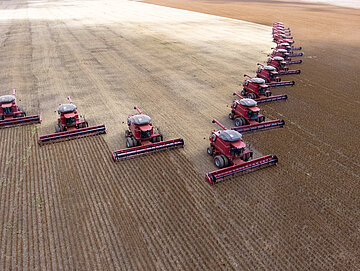UkrLandFarming: agribusiness giant on the edge of downfall?
05 March 2020
Corruption scandals and dramatic bankruptcies are not uncommon in the agribusiness of transition and emerging economies. When a large market player gets involved in a controversial story, it often gains widespread attention not only in the country of its operation, but also abroad, given its links to international capital and commodity markets. Importantly, uncovering the roots of this problem may sometimes raise more questions than answers.
The most recent example is the case of UkrLandFarming, a group of companies once known as the largest Ukrainian agroholding in terms of farmland use. UkrLandFarming is a complex vertically-integrated structure engaged in crop, livestock, pork and egg production in 22 (of 25) regions of Ukraine. The company generates about 1% of Ukraine’s GDP. Its farmland area is about 500,000 hectares today. Five years ago, it was around 640,000 hectares but the company’s land use has reduced, partly due to annexation of the Crimean Peninsula by Russian Federation and Russia-backed unrest in eastern regions of Ukraine. A part of the UkrLandFarming group is the Avangard agroholding, a publicly listed Ukrainian company which is Europe’s largest egg producer.
Over the past several years UkrLandFarming has been facing hard times due to complicated situation around its owner Oleh Bakhmatyuk, a Ukrainian businessman who is active in several businesses including agriculture, mass media, and finance.
UkrLandFarming got into trouble in 2014, when two banks owned by Oleh Bakhmatyuk at that time, VAB Bank and Financial Initiative Bank, were declared bankrupt. In 2016, Ukrainian law enforcement authorities started investigating the case of VAB Bank. In particular, their attention was attracted by the fact that VAB Bank received a $ 49 million stabilization loan from the National Bank of Ukraine (NBU) for debt restructuring shortly before VAB’s filing for bankruptcy.
As reported by the National Anti-Corruption Bureau of Ukraine (NABU), the loan was secured with property, whose market value was 25 times lower than the estimated value provided by VAB Bank. Despite this, the National Bank of Ukraine approved the loan. A month after the loan was issued, VAB Bank was declared bankrupt and the loan remained unpaid although it was initially planned for a two-year repayment term. After several years of investigation, in 2019, NABU handed the case over to the National Police of Ukraine where it was officially closed with no consequences for the accused parties.
The collapse of VAB Bank has increased the level of indebtedness of UkrLandFarming and compelled Mr. Bakhmatyuk to search for new ways of debt restructuring. In 2015, Avangard arranged to prolong its Eurobonds in the amount of $200 million for another three years. In 2016-2017, UkrLandFarming reached an agreement with most of its foreign creditors in order to restructure its Eurobonds worth $500 million. In early 2019, UkrLandFarming together with Avangard negotiated a deal with Ukrainian Oshchadbank on restructuring their debt to the bank in the amount of $180 million. Currently, the total debt burden of the company is estimated at $1.65 billion, of which $1.25 billion is the debt to the foreign creditors.
The situation seemed to be cleared in mid-2019 as the case of VAB Bank was closed. However, the newly appointed Procurator-General of Ukraine Ruslan Ryaboshapka alongside the Head of NABU Artem Sytnyk reopened the investigation of the case of VAB Bank several months ago and accused Oleh Bakhmatyuk of inappropriate use of a $ 49 million stabilization loan from the National Bank of Ukraine issued in 2014. Mr. Bakhmatyuk was also accused of colluding with the former Deputy Head of NBU Oleksandr Pysaruk and several other high-ranking officials, who approved the loan.
Oleh Bakhmatyk was declared wanted in charge of money-laundering, embezzlement and illicit enrichment, and abruptly left the country with his family. He stays now in Vienne, where he hired the lawyers who are trying to sort the things out.
Meanwhile, NABU started inspections and check-ups at the enterprises of UkrLandFarming and, reportedly, restricted access to investigation materials for Bakhmatyuk’s lawyers. In an attempt to avoid further escalation, Oleh Bakhmatyuk claimed to have approached the Ukrainian legal bodies with an offer to repay $327 million of the total debt of VAB Bank, which exceeds six times the amount in the case dispute, using restructuring tools and attracting independent auditors. In addition, Mr. Bakhmatyuk made several open statements appealing to Ukrainian President Volodymyr Zelensky and addressing the issue of “unauthorized” inspections at UkrLandFarming's enterprises and government’s pressure on his businesses. However, these statements went unanswered.
The ongoing legal proceedings on the VAB Bank’s case raised concerns among the international creditors of UkrLandFarming. In particular, Rothschild & Co on behalf of Gramercy Funds Management LLC, The Export–Import Bank of the United States, Pala Assets Limited, and Denmark's Export Credit Agency (EKF) expressed their intention to meet with Ukrainian officials in order to discuss the possible risks of the current legal proceedings for UkrLanFarming. However, it is not clear at the moment whether they succeeded in making a respective appointment with Ukrainian public bodies. The situation is still unpredictable.
Given the scale of operations of UkrLandFarming, some experts estimate that the aftershocks from this scandal might seriously affect the Ukrainian economy. The others suggest that, if UkrLandFarming collapses, it may be split among the other market players. However, all experts unanimously admit that the problem, if not negotiated and solved, will bring no good to Ukrainian agricultural sector and cause the shortage of investments into the country.







